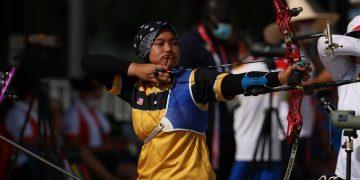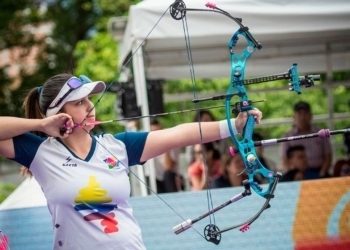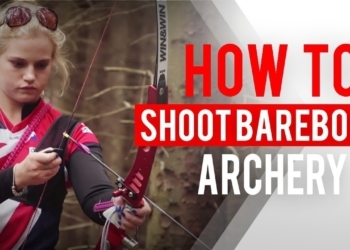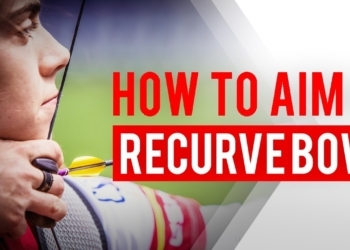Excelling in archery is all about efficiency and alignment. You want to support as much of the bow’s draw weight (poundage) as possible through bone structure, not muscle. Aligning the draw weight along your skeletal frame lets you shoot longer, handle more poundage, and reduce the risks of painful muscle injuries.
Setting your front shoulder too high is a common problem for beginning archers, and some top archers, too. Archers who set that shoulder high during the shot routine can run into some problems; mainly, the bow’s force pushing back into the archer goes up toward the head instead of across both shoulders toward the drawing arm.
That position weakens the archer’s position and shortens the draw length. Ideally, the front shoulder forms a relatively straight line across the top of both shoulders to properly align the bones. Realize, however, that not all body types can do that. A reliable indicator of problems is seeing the shoulder rise above the arrow while at full draw.
To fix a high front-shoulder problem, you must get stronger, reduce the bow’s poundage, or change how you set up your shot. Increasing your strength doesn’t just mean shooting more arrows. Granted, that strengthens archery muscles, but it rarely fixes high front-shoulder problems. High-level archers must understand the jobs each muscle performs, and how to use those muscles to their advantage.
Keeping the front shoulder down requires archers to engage the pectoral, latissimus dorsi, and serratus anterior muscles. Good core strength also reduces the archer’s tendency to arch their back, which raises the chest and forces the shoulder up. Do exercises that focus on those muscles and that will give you a better sense of how they’re used and how to engage them to position your shoulder.
Reducing your bow’s draw weight can also help with the high shoulder because the poundage could be too much to handle. Reducing poundage lets you get used to the feel of the low front shoulder. Once that feels natural, slowly increase the draw weight over several weeks—or months—while monitoring the front shoulder.

Some archers change the way they set up their shots to properly set their shoulder. Setting the shoulder while it’s under pressure (fighting the poundage) is usually more difficult than setting it earlier when it’s not being pushed. Simply shortening the pre-draw can let archers set their shoulder into a lower position for better alignment. To shorten the pre-draw, pull back less arrow before raising the bow. That puts less poundage on your shoulder and lets you set it correctly.
Another method for setting the shoulder down is called “scooping,” which you do before/during the pre-draw. To scoop your shoulder, push your straight bow arm away from you at a 45-degree downward angle and immediately raise the bow to your pre-draw position. This motion mimics “scooping” under something with your bow arm, which helps set the front shoulder lower.
Another shoulder-setting method is to think of “pressing” your bow arm toward the target while pushing your armpit downward at a 45-degree angle away from your body. Archers usually do this while settling into their anchor and maintaining it throughout the shot. This technique gives your shoulder something to do instead of trying to be static. This is one of archery’s idiosyncrasies where it can create stillness from movement.
Setting the front shoulder takes time and effort. Know your strength limits and don’t skips steps when fixing the problem. One great tool is video feedback. Almost everyone has a smartphone, so you can watch your progression with video for immediate feedback on what needs work. Some apps have a video delay feature that lets you watch on a continuous video so you won’t have to stop and watch the entire recording after you finish shooting.
If you’re patient and take your time, you’ll fix the front shoulder problem. After that, you’ll enjoy many years of pain-free, enjoyable shooting.


















